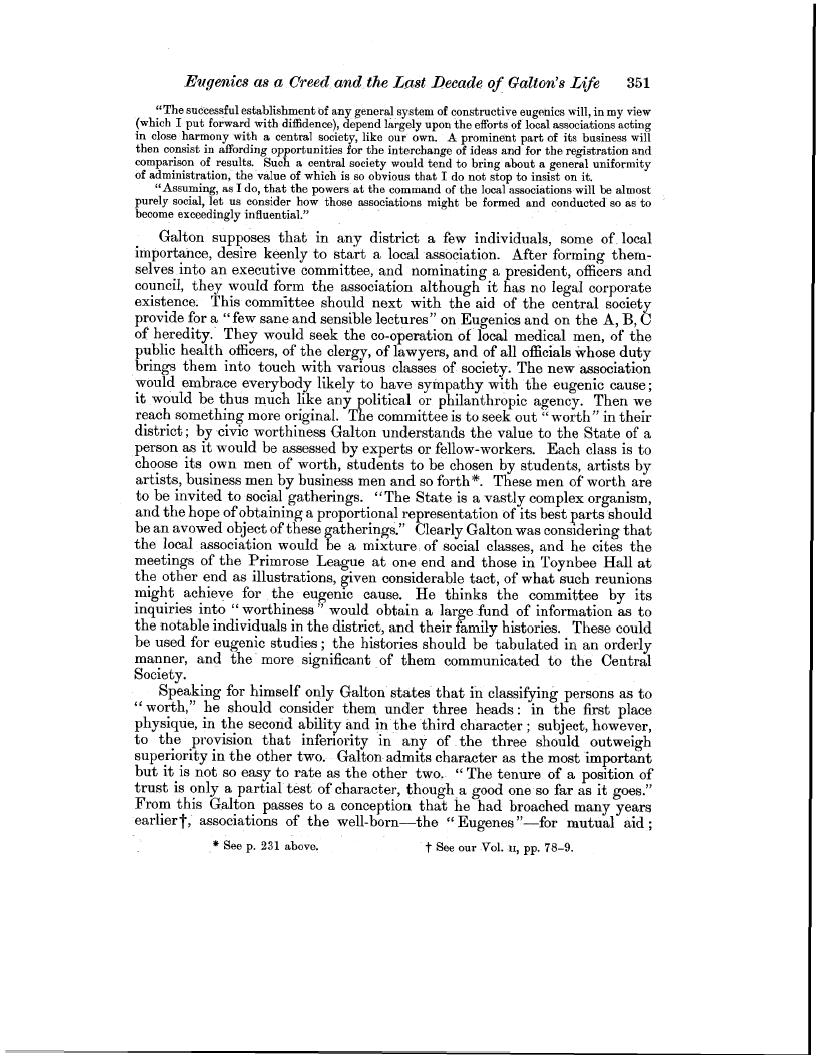| ||||||

OCR Rendition - approximate
Eugenics as a Creed andd the Last Decade of Calton's Life 351 "The successful establishment of any general system of constructive eugenics will, in my view (which I put forward with diffidence), depend largely upon the efforts of local associations acting in close harmony with a central society, like our own. A prominent part of its business will then consist in affording opportunities for the interchange of ideas and for the registration and comparison of results. Such a central society would tend to bring about a general uniformity of administration, the value of which is so obvious that I do not stop to insist on it. "Assuming, as I do, that the powers at the command of the local associations will be almost purely social, let us consider how those associations might be formed and conducted so as to become exceedingly influential." Galton supposes that in any district a few individuals, some of, local importance, desire keenly to start a local association. After forming themselves into an executive committee, and nominating a president, officers and council, they would form the association although it has no legal corporate existence. This committee should next with the aid of the central society provide for a_ "few sane and sensible lectures" on Eugenics and on the A, B, C of heredity.- They would seek the co-operation of local medical men, of the public health officers, of the clergy, of lawyers, and of all officials whose duty brings them into touch with various classes of society. The new association would embrace everybody likely to have sympathy with the eugenic cause; it would be thus much like any political or philanthropic agency. Then we reach something more original. The committee is to seek out "worth" in their district ; by civic worthiness Galton understands the value to the State of a person as it would be assessed by experts or fellow-workers. Each class is to choose its own men of worth, students to be chosen by students, artists by artists, business men by business men and so forth*. These men of worth are to be invited to social gatherings. "The State is a vastly complex organism, and the hope of obtaining a proportional representation of its best parts should be an avowed object of these gatherings." Clearly Galton was considering that the local association would be a mixture, of social classes, and he cites the meetings of the Primrose League at one end and those in Toynbee Hall at the other end as illustrations, given considerable tact, of what such reunions might achieve for the eugenic cause. He thinks the committee by its inquiries into " worthiness " would obtain a large -fund of information as to the notable individuals in the district, and their family histories. These could be used for eugenic studies ; the histories should be tabulated in an orderly manner, and the more significant -of them communicated to the Central Society. Speaking for himself only Galton states that in classifying persons as to "worth," he should consider them under three heads : in the first place physique, in the second ability and in the third character ; subject, however, to the provision that inferiority in any of . the three should outweigh superiority in the other two. Galton- admits character as the most important but it is not so easy to rate as the other two._ " The tenure of a position of trust is only a partial test of character, though a good one so far as it goes." From this Galton passes to a conception that he bad broached many years earlier t associations of the well-born-the Eugenes "-for mutual aid; * See p. 231 above. t See our -Yol. Ii, pp. 78-9.
|